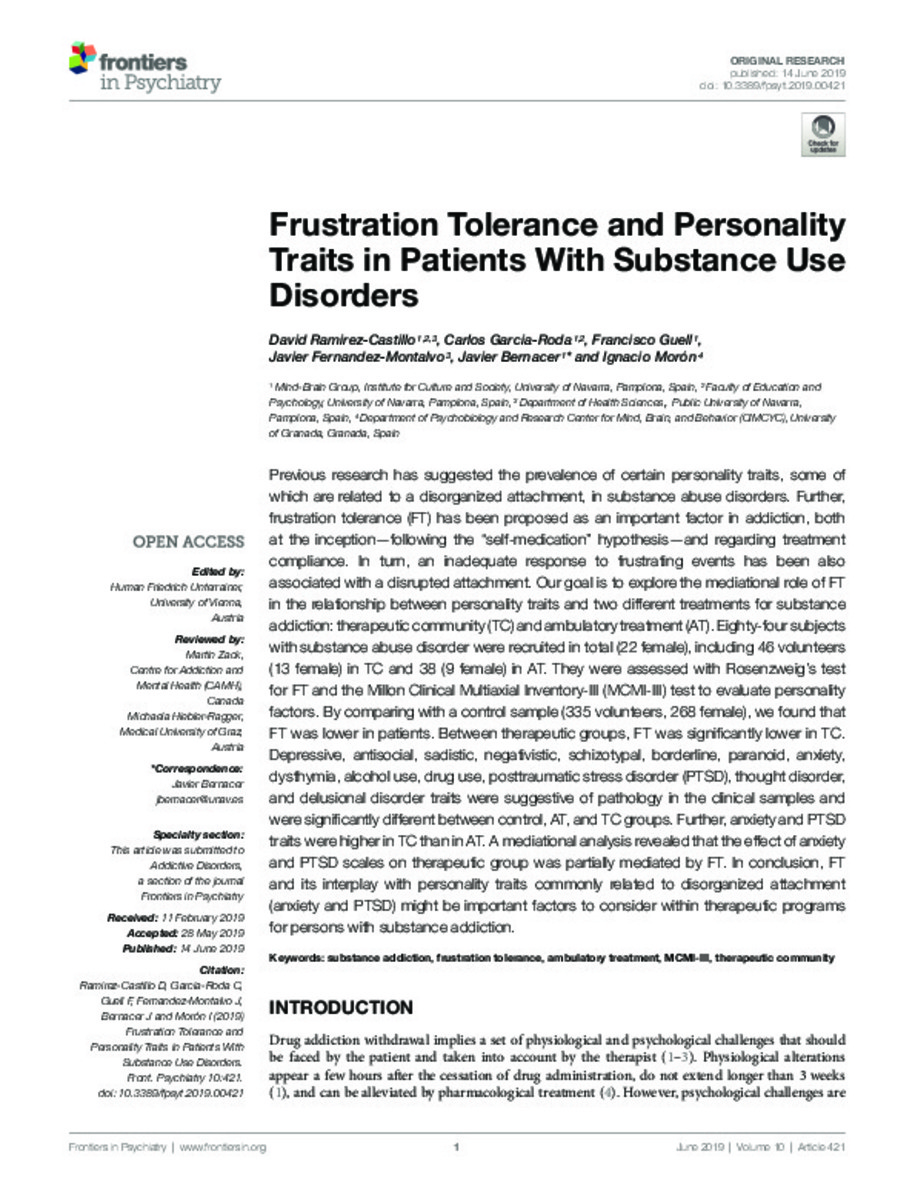Full metadata record
| DC Field | Value | Language |
|---|---|---|
| dc.creator | Ramírez-Castillo, D. (David) | - |
| dc.creator | García-Roda, C. (Carlos) | - |
| dc.creator | Güell-Pelayo, F. (Francisco) | - |
| dc.creator | Fernández-Montalvo, J. (Javier) | - |
| dc.creator | Bernácer-María, J. (Javier) | - |
| dc.creator | Morón-Henche, I. (Ignacio) | - |
| dc.date.accessioned | 2020-07-30T08:18:59Z | - |
| dc.date.available | 2020-07-30T08:18:59Z | - |
| dc.date.issued | 2019 | - |
| dc.identifier.citation | Ramirez-Castillo D, Garcia-Roda C, Guell F, Fernandez-Montalvo J, Bernacer J and Morón I (2019) Frustration tolerance and personality traits in patients with substance use disorders. Front. Psychiatry 10:421 | es_ES |
| dc.identifier.issn | 1664-0640 | - |
| dc.identifier.uri | https://hdl.handle.net/10171/59134 | - |
| dc.description.abstract | Previous research has suggested the prevalence of certain personality traits, some of which are related to a disorganized attachment, in substance abuse disorders. Further, frustration tolerance (FT) has been proposed as an important factor in addiction, both at the inception—following the “self-medication” hypothesis—and regarding treatment compliance. In turn, an inadequate response to frustrating events has been also associated with a disrupted attachment. Our goal is to explore the mediational role of FT in the relationship between personality traits and two different treatments for substance addiction: therapeutic community (TC) and ambulatory treatment (AT). Eighty-four subjects with substance abuse disorder were recruited in total (22 female), including 46 volunteers (13 female) in TC and 38 (9 female) in AT. They were assessed with Rosenzweig’s test for FT and the Millon Clinical Multiaxial Inventory-III (MCMI-III) test to evaluate personality factors. By comparing with a control sample (335 volunteers, 268 female), we found that FT was lower in patients. Between therapeutic groups, FT was significantly lower in TC. Depressive, antisocial, sadistic, negativistic, schizotypal, borderline, paranoid, anxiety, dysthymia, alcohol use, drug use, posttraumatic stress disorder (PTSD), thought disorder, and delusional disorder traits were suggestive of pathology in the clinical samples and were significantly different between control, AT, and TC groups. Further, anxiety and PTSD traits were higher in TC than in AT. A mediational analysis revealed that the effect of anxiety and PTSD scales on therapeutic group was partially mediated by FT. In conclusion, FT and its interplay with personality traits commonly related to disorganized attachment (anxiety and PTSD) might be important factors to consider within therapeutic programs for persons with substance addiction. | es_ES |
| dc.description.sponsorship | This project was funded by Fundación Caja de Ahorros de Navarra (grant number 70721) and the Spanish Ministerio de Sanidad, Servicios Sociales e Igualdad (2016/057). | es_ES |
| dc.language.iso | eng | es_ES |
| dc.publisher | Frontiers Media | es_ES |
| dc.relation | 70721 (FCT); 2016/057 (FCT) | es_ES |
| dc.rights | info:eu-repo/semantics/openAccess | es_ES |
| dc.subject | Substance addiction | es_ES |
| dc.subject | Frustration tolerance | es_ES |
| dc.subject | Ambulatory treatment | es_ES |
| dc.subject | Therapeutic community | es_ES |
| dc.title | Frustration tolerance and personality traits in patients with substance use disorders | es_ES |
| dc.type | info:eu-repo/semantics/article | es_ES |
| dc.editorial.note | This is an open-access article distributed under the terms of the Creative Commons Attribution License (CC BY) | es_ES |
| dc.identifier.doi | https://doi.org/10.3389/fpsyt.2019.00421 | es_ES |
| dadun.citation.endingPage | 12 | es_ES |
| dadun.citation.number | 421 | es_ES |
| dadun.citation.publicationName | Frontiers in Psychiatry | es_ES |
| dadun.citation.startingPage | 1 | es_ES |
| dadun.citation.volume | 10 | es_ES |
Files in This Item:
Statistics and impact
Items in Dadun are protected by copyright, with all rights reserved, unless otherwise indicated.






